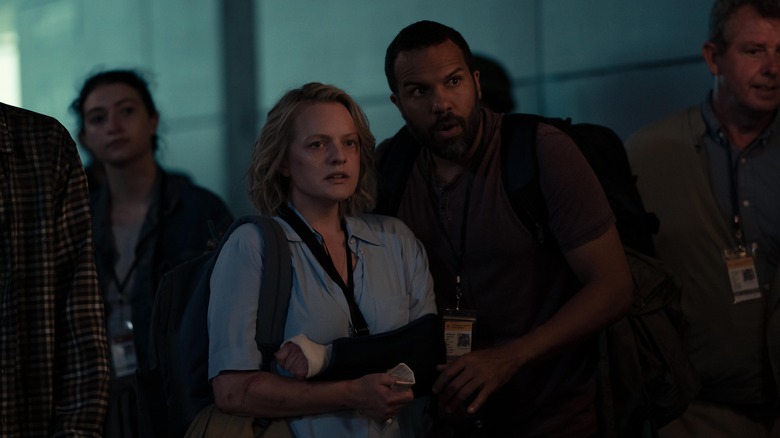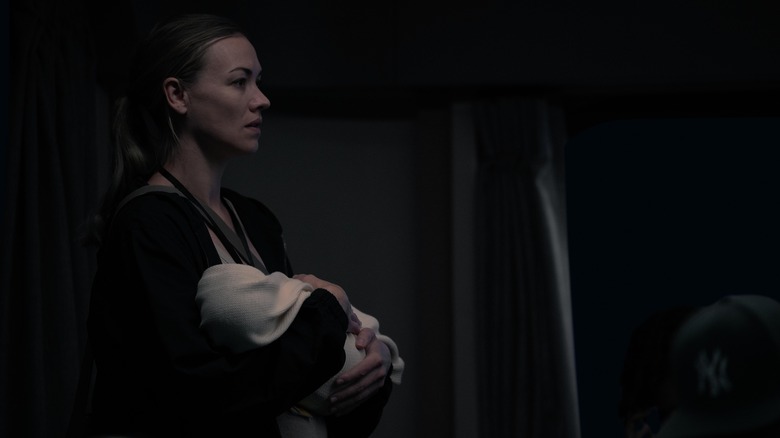The Season 5 Finale Of The Handmaid's Tale Sent A Chilling Election Night Warning
We may receive a commission on purchases made from links.
Once you see something, you can't unsee it. June Osborne can't unsee Gilead: its reach, its control, the way the regime empowers and inspires hatred. When she first got to Canada, Gilead's reach had a clear border, but in the Season 5 finale of "The Handmaid's Tale," that wall has come crumbling down.
In Season 1, Episode 3, June explains in voiceover how Gilead took over before. "When they slaughtered Congress, we didn't wake up," she admits. "When they blamed terrorists and suspended the Constitution, we didn't wake up either. They said it would be temporary. Nothing changes instantaneously," she warned. In Season 5, Episode 10, June tells Luke she's not going back to sleep this time.
The change has been slowly happening — a "gradually heating bathtub" — over the last two seasons of "The Handmaid's Tale." Serena and Fred Waterford's group of supporters slowly grew as Serena's pregnancy continued, mirrored in the group of protestors growing outside of June and Luke's home in Toronto. The support Serena felt from the Canadians in Season 5, Episode 1 was what emboldened her to try for one more power grab in Gilead. Tempers boiled over in the penultimate episode of Season 5 – Serena's escape and the protest shooting – and season 5 ends just as it began: with the dust settling around violence.
But unlike at the beginning of the season, June's homeless and packless, and can no longer deny just how familiar to Gilead Canada has become.
Anti-American protests are getting worse in The Handmaid's Tale
Everything that happens inside "The Handmaid's Tale," whether it's Margaret Atwood's book or the Hulu adaptation, has its foundation in our world. Of the many twists and turns in the Season 5 finale, none may have been more shocking and sickening than watching June getting hit and run over repeatedly by a large truck.
"Well, it seems to be what people in America certainly like to do to people they don't like," showrunner Bruce Miller told Entertainment Weekly. Just a few months ago, a man drove his pickup truck into a group of pro-abortion protestors in Cedar Rapids, Iowa, but the weaponization of cars at protests was popularized before that; back in 2019, James Alex Fields, Jr. was sentenced to life in prison after he drove his car into a crowd of protestors in Charlottesville Virginia in August of 2017. Ari Weil, a researcher at the Chicago Project on Security and Threats, told the New Republic he tracked "72 incidents of cars driving into protestors across 52 different cities" in just one month in 2020.
This was after a man sent rifle shots through a crowd gathered at a memorial for fallen American soldiers — the one Mark Tuello shrugs off, pointing out that there's always going to be an angry guy with a gun. It's just one of the horrific realities of the temperature of the bathtub they're hoping not to boil to death in.
Tiny acts of rebellion have major impacts for many characters
In Gilead especially, every action seems to have layers of meaning that viewers need to decipher to understand where on the scale of good to evil a character sits. Nick Blaine, for instance, has always been an enigma; who or what he supported wasn't really clarified until he punched Commander Lawrence in the face in Season 5, Episode 10 of "The Handmaid's Tale."
Hannah, June and Luke's daughter, also gives us a glimpse of what she's feeling. In a striking scene set at the wife "training school" Hannah's been sent to, we watch Hannah pull out a book. The book is Gilead-approved (no words, just pictures) but Hannah has tucked a drawing into the back, hidden from any Aunt's prying eyes. After checking to make sure no one was watching, Hannah writes her name at the bottom of the picture, something she could lose a finger or hand for if she's caught. Elisabeth Moss, who plays June Osborne and directed the Season 5 finale, told Forbes this move foreshadows the future, that there's "a whole other story to tell."
Naomi — formerly Mrs. Putnam, now Mrs. Lawrence — also slips, calling Janine by her real name. When Naomi corrects herself, calling Janine "Ofjoseph," Janine snaps. Standing in the same place June and Emily once stood, Janine finally lets down her Gilead guard and tells Naomi exactly how she feels. "I hate you," Janine says. "How can you not know that?"
Gilead has come to Canada
By the end of Season 5, Episode 10, June is feeling the water starts to boil. The bulletproof vest June ordered at the beginning of the episode won't be enough to keep her safe from the people who want her dead. Neither will the gun Luke procured, or Tuello's word to Nick. Fortunately, June can see the blood-red writing on the walls: Canada is not safe.
Luke wants to argue with this, telling June that Canada isn't Gilead; that they'll be safe if they stay in Toronto. He's trying to hold on hard to the "It Can't Happen Here" mentality — Canada is safe, Canada is not Gilead — but June knows the dangers of this kind of nostalgia. "America wasn't Gilead until it was," she reminds him. June knows what Luke doesn't: Gilead is everywhere.
"Gilead is within you," Margaret Atwood's book-version of Aunt Lydia tells June early on in "The Handmaid's Tale." In Hulu's adaptation, "Gilead" might as well be synonymous with hatred looking for any outlet. Anti-American protestors aren't Gilead citizens who have been sent over to make June's life miserable; these are Canadians who are inspired by Gilead's way of life and who want the American refugees out.
"We didn't see how much they hated us," June reminds Luke, referencing the time before America fell. But by the end of Season 5, it's clear how much people hate American refugees — and hate June in particular.
The Handmaid's Tale continues to be eerily timely
The packed train station of Toronto in Season 5, Episode 10 of "The Handmaid's Tale" reflects those of Ukraine back in February, when Russia began its still ongoing war with the country. In March, Business Insider reported a typical journey by train from Lviv, Ukraine to Premysl, Poland was a 12-hour ride in a train car that was packed at double capacity. A quick Google search reveals it takes four days to get to Vancouver from Toronto by train, a journey that could take longer depending on what showrunner Bruce Miller delivers in Season 6.
While there are overarching themes of "The Handmaid's Tale" that obviously draw from real life — just look at the timeline of Roe vs. Wade — Miller told The Hollywood Reporter that the overlapping events in "The Handmaids Tale" and the real world were unplanned during the show's creation. It's the marketing team he credits with the fact that the Season 5 finale landed the same night as the 2022 midterm elections.
But some things — like Fred Waterford's overly-choreographed state funeral airing the same week as Queen Elizabeth II's funeral and the fall of Roe v. Wade — that even marketing teams don't have control over.




